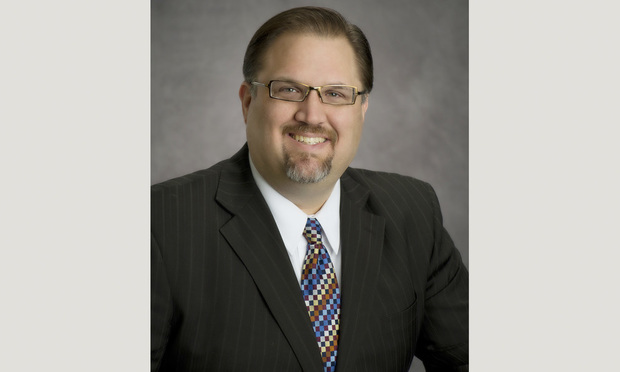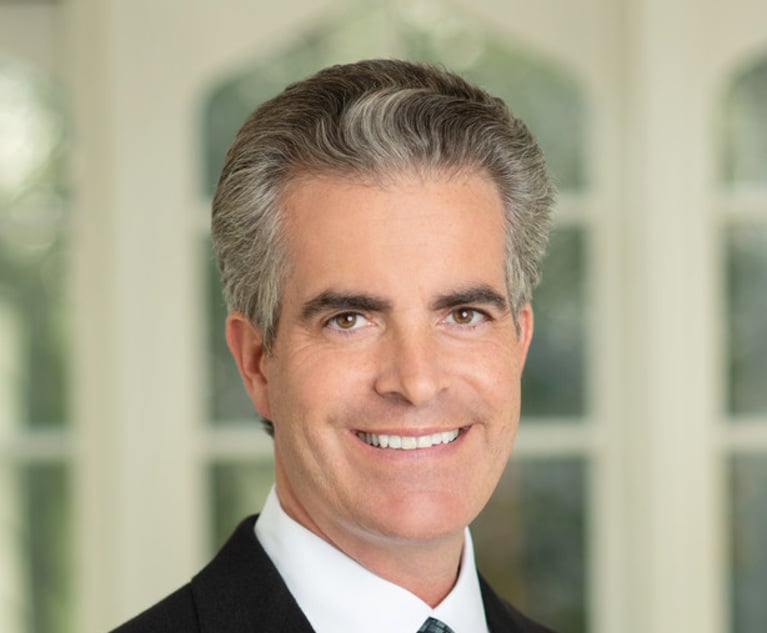Life Sciences and Medical Tech Legal Trends for 2020
The life sciences and medical technology space is growing rapidly; trends in this space for 2020 reflect this growth. This article addresses the trends to expect, and how that may impact the work their attorneys will be facing in 2020 and beyond.
February 14, 2020 at 01:37 PM
6 minute read
 Christopher Ezold of Wisler Pearlstine.
Christopher Ezold of Wisler Pearlstine.
The life sciences and medical technology space is growing rapidly; trends in this space for 2020 reflect this growth. This article addresses the trends to expect, and how that may impact the work their attorneys will be facing in 2020 and beyond.
- Data can be A client's most important asset.
For some time, life sciences companies have been collecting information without an efficient means to monetize the data. Increasingly, artificial intelligence (AI) and machine-learning tools are informing the analytics companies can provide their customers using this data. These technologies are impacting research, testing, patient care, diagnostics, therapeutic approaches and outpatient care. They provide alternative revenue streams, but also complicate partnerships necessary for development, growth and marketing. Attorneys representing life sciences companies will need to not only be aware of data development and ownership considerations in development, partnership, customer and vendor agreements, but proactively educate themselves on the potential uses of such data. Frequently, the value of data becomes apparent to a client well after the contract is executed—and it will be up to the attorney to raise these issues for consideration beforehand. This will be complicated by the patchwork quilt of data privacy laws that these companies face; HIPAA, common law, the California Consumer Privacy Act (CCPA) and more will all need to be considered to ensure that a client's data needs are not curtailed.
AI and machine-learning medical tech products that evolve and develop on their own during use by patients or consumers are also emerging. The FDA has already begun working on a new streamlined method of 510,000 approvals for AI and machine-learning products that evolve out of their approved specifications. Medical tech device attorneys will need to be aware of the development of these regulations and advise their clients accordingly.
- Business models are changing.
Software-as-a-Service (SaaS) business models are increasing, both in acceptance by the market and by life sciences and medical technology companies. As the market increasingly recognizes that access and control of data is more efficient in the cloud, and increasingly values the regular security updates, feature add-ons and connectivity of SaaS products, the market share and profitability of SaaS companies grows. Master service agreements, scope of work addenda and other documents will become routine in these companies' transactions.
Value-based pricing, bundle billing and the basing reimbursements on community health instead of fee-for-service is putting significant negative pressure on health care providers' profitability. This will lead to business opportunities for life sciences and med tech companies as they pivot to provide savings and efficiencies as part of their offerings. In turn, percentage-of-savings fees and other contract terms will become normalized.
As larger health organizations seek to reduce expenses, group purchasing organizations (GPOs) are having an increased effect on the market; contracts with GPOs will become more important to life sciences and med tech clients. Once a GPO contract is in place, contracts with GPO members will not need to be negotiated separately. However, many GPO contracts contain strong protections for their members, including "most favored nation" pricing clauses, which will require attorneys to ensure that subsequent client contracts do not create breaches of existing GPO contracts.
- Hot products gain maturity.
Wearables have been a buzzword for years; 2020 may be the year they achieve some maturity in the market. This trend may be supported by the movement of inpatient procedures to outpatient facilities, an increase in home health care and increased interconnectivity of unrelated health care teams taking care of shared patients. Wearables have primarily been focused on self-care; emerging growth companies are developing wearables that create greater self-sufficiency in users while providing transparent oversight and monitoring for caregivers. This maturing of wearables from a self-focused product to one spanning the needs of multiple types of consumers will continue.
Analytics in diagnostics, radiology, community health and predictive/prevention products and services have been growing in sophistication and evidence-based support for their efficacy. Expect 2020 to show many small leaps for these technologies, especially as some legacy technologies are combined and leveraged with emerging technologies.
Cybersecurity products will grow in their impact on the life sciences/med tech space; as data becomes more important, data privacy laws are proliferating. Compliance will become a significant part of practice for attorneys advising these companies, especially as these clients routinely practice across many states' lines. National legislation on data security appears inevitable—but likely years down the road.
Advising clients on proactive planning and compliance is likely to become a requirement of competent practice; be aware that many clients, especially emerging growth entities, will push back due to lack of funds and bandwidth. Documenting your advice and engaging in effective communications strategies with your clients will become increasingly important.
Conclusion
Look for the above trends to merge. Maturing existing medical technologies by shrinking their size, reducing the number of staff necessary to use them and increasing their ease of use, will lead to more revenue for providers and accelerate the growth of in-office clinical procedures—coupled with the ability to acquire the hardware on a SaaS-style procedure-based fee structure, eliminating large upfront costs. Transactions and business models monetizing data collected by these technologies and expanding wearable and other personal devices for data collection purposes will increasingly become a tangled web due to the wide range of data privacy laws emerging state by state.
These developments will require attorneys representing med tech and life sciences companies to widen their focus on data privacy, licensing and other issues relating to data in order to not only draft transactional documents, but to advise clients on business plans, required team members, the benefits and dangers of proposed corporate transactions and more. Educating yourself in both these legal developments and the emerging technology landscape underlying them will give you an edge in providing value to your client.
Christopher Ezold is a partner in the business, corporate and tax practice group of Wisler, Pearlstine, as well as an assistant director of the firm's general counsel initiative. Ezold acts as outside general counsel to companies in the biotech, life sciences, health care, emerging growth and technology industries. He is also a sponsor of the Mid-Atlantic Region of The Keiretsu Forum, the world's largest angel investment group. Contact him at [email protected].
This content has been archived. It is available through our partners, LexisNexis® and Bloomberg Law.
To view this content, please continue to their sites.
Not a Lexis Subscriber?
Subscribe Now
Not a Bloomberg Law Subscriber?
Subscribe Now
NOT FOR REPRINT
© 2025 ALM Global, LLC, All Rights Reserved. Request academic re-use from www.copyright.com. All other uses, submit a request to [email protected]. For more information visit Asset & Logo Licensing.
You Might Like
View All
Superior Court Rejects Pa. Hospital's Challenge to $7.3M Med Mal Judgment
3 minute read
Longtime Reed Smith Health Care Partner Opts for Solo Practice Over Retirement
3 minute read
Pa. Appeals Court: Trial Judge Dismissed Med Mal Claims Without Giving Plaintiffs Proper Time to Fight Back
4 minute read
Pa. Hospital Agrees to $16M Settlement Following High Schooler's Improper Discharge
4 minute readLaw Firms Mentioned
Trending Stories
- 1Decision of the Day: Judge Dismisses Defamation Suit by New York Philharmonic Oboist Accused of Sexual Misconduct
- 2California Court Denies Apple's Motion to Strike Allegations in Gender Bias Class Action
- 3US DOJ Threatens to Prosecute Local Officials Who Don't Aid Immigration Enforcement
- 4Kirkland Is Entering a New Market. Will Its Rates Get a Warm Welcome?
- 5African Law Firm Investigated Over ‘AI-Generated’ Case References
Who Got The Work
J. Brugh Lower of Gibbons has entered an appearance for industrial equipment supplier Devco Corporation in a pending trademark infringement lawsuit. The suit, accusing the defendant of selling knock-off Graco products, was filed Dec. 18 in New Jersey District Court by Rivkin Radler on behalf of Graco Inc. and Graco Minnesota. The case, assigned to U.S. District Judge Zahid N. Quraishi, is 3:24-cv-11294, Graco Inc. et al v. Devco Corporation.
Who Got The Work
Rebecca Maller-Stein and Kent A. Yalowitz of Arnold & Porter Kaye Scholer have entered their appearances for Hanaco Venture Capital and its executives, Lior Prosor and David Frankel, in a pending securities lawsuit. The action, filed on Dec. 24 in New York Southern District Court by Zell, Aron & Co. on behalf of Goldeneye Advisors, accuses the defendants of negligently and fraudulently managing the plaintiff's $1 million investment. The case, assigned to U.S. District Judge Vernon S. Broderick, is 1:24-cv-09918, Goldeneye Advisors, LLC v. Hanaco Venture Capital, Ltd. et al.
Who Got The Work
Attorneys from A&O Shearman has stepped in as defense counsel for Toronto-Dominion Bank and other defendants in a pending securities class action. The suit, filed Dec. 11 in New York Southern District Court by Bleichmar Fonti & Auld, accuses the defendants of concealing the bank's 'pervasive' deficiencies in regards to its compliance with the Bank Secrecy Act and the quality of its anti-money laundering controls. The case, assigned to U.S. District Judge Arun Subramanian, is 1:24-cv-09445, Gonzalez v. The Toronto-Dominion Bank et al.
Who Got The Work
Crown Castle International, a Pennsylvania company providing shared communications infrastructure, has turned to Luke D. Wolf of Gordon Rees Scully Mansukhani to fend off a pending breach-of-contract lawsuit. The court action, filed Nov. 25 in Michigan Eastern District Court by Hooper Hathaway PC on behalf of The Town Residences LLC, accuses Crown Castle of failing to transfer approximately $30,000 in utility payments from T-Mobile in breach of a roof-top lease and assignment agreement. The case, assigned to U.S. District Judge Susan K. Declercq, is 2:24-cv-13131, The Town Residences LLC v. T-Mobile US, Inc. et al.
Who Got The Work
Wilfred P. Coronato and Daniel M. Schwartz of McCarter & English have stepped in as defense counsel to Electrolux Home Products Inc. in a pending product liability lawsuit. The court action, filed Nov. 26 in New York Eastern District Court by Poulos Lopiccolo PC and Nagel Rice LLP on behalf of David Stern, alleges that the defendant's refrigerators’ drawers and shelving repeatedly break and fall apart within months after purchase. The case, assigned to U.S. District Judge Joan M. Azrack, is 2:24-cv-08204, Stern v. Electrolux Home Products, Inc.
Featured Firms
Law Offices of Gary Martin Hays & Associates, P.C.
(470) 294-1674
Law Offices of Mark E. Salomone
(857) 444-6468
Smith & Hassler
(713) 739-1250





